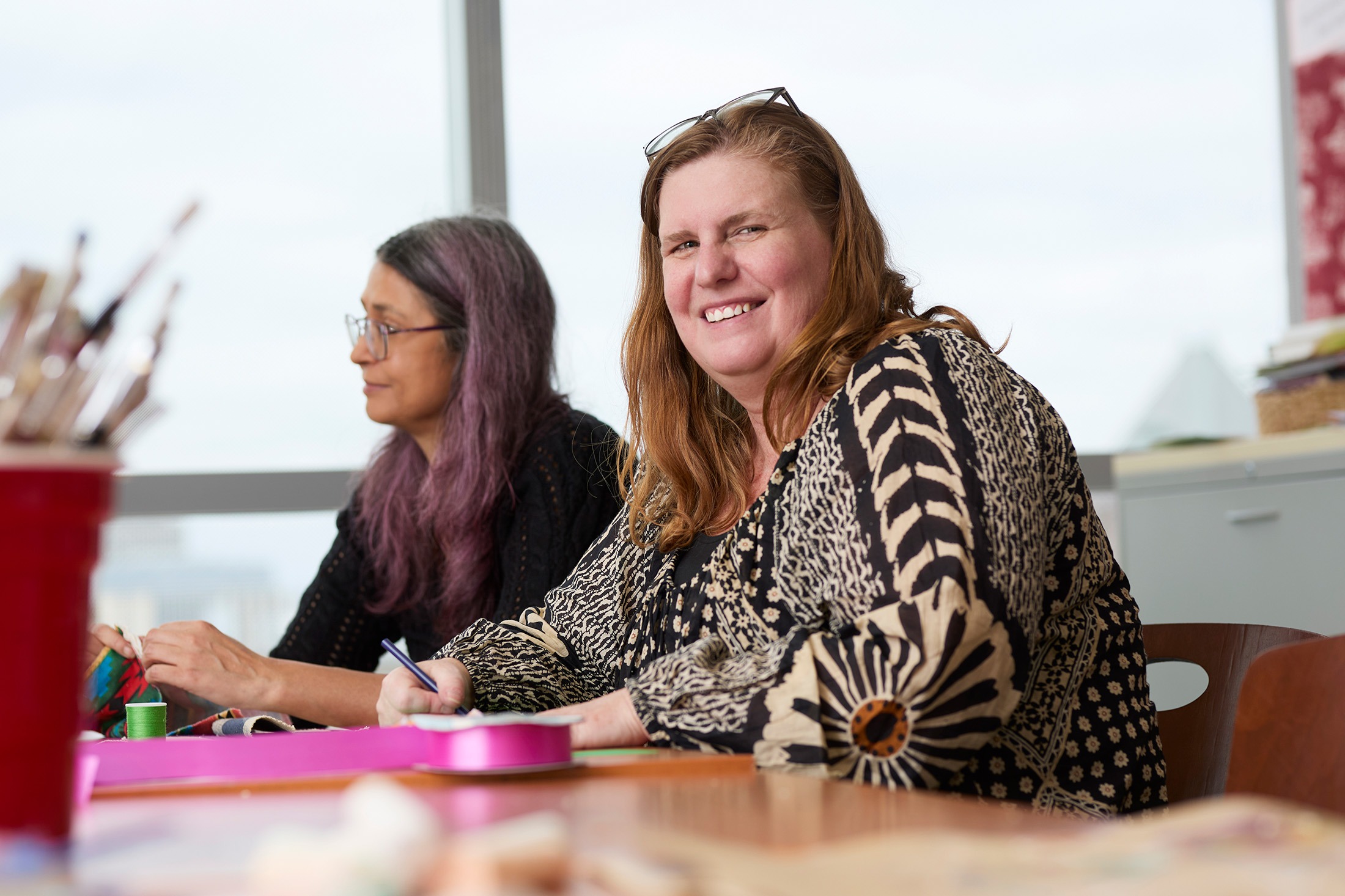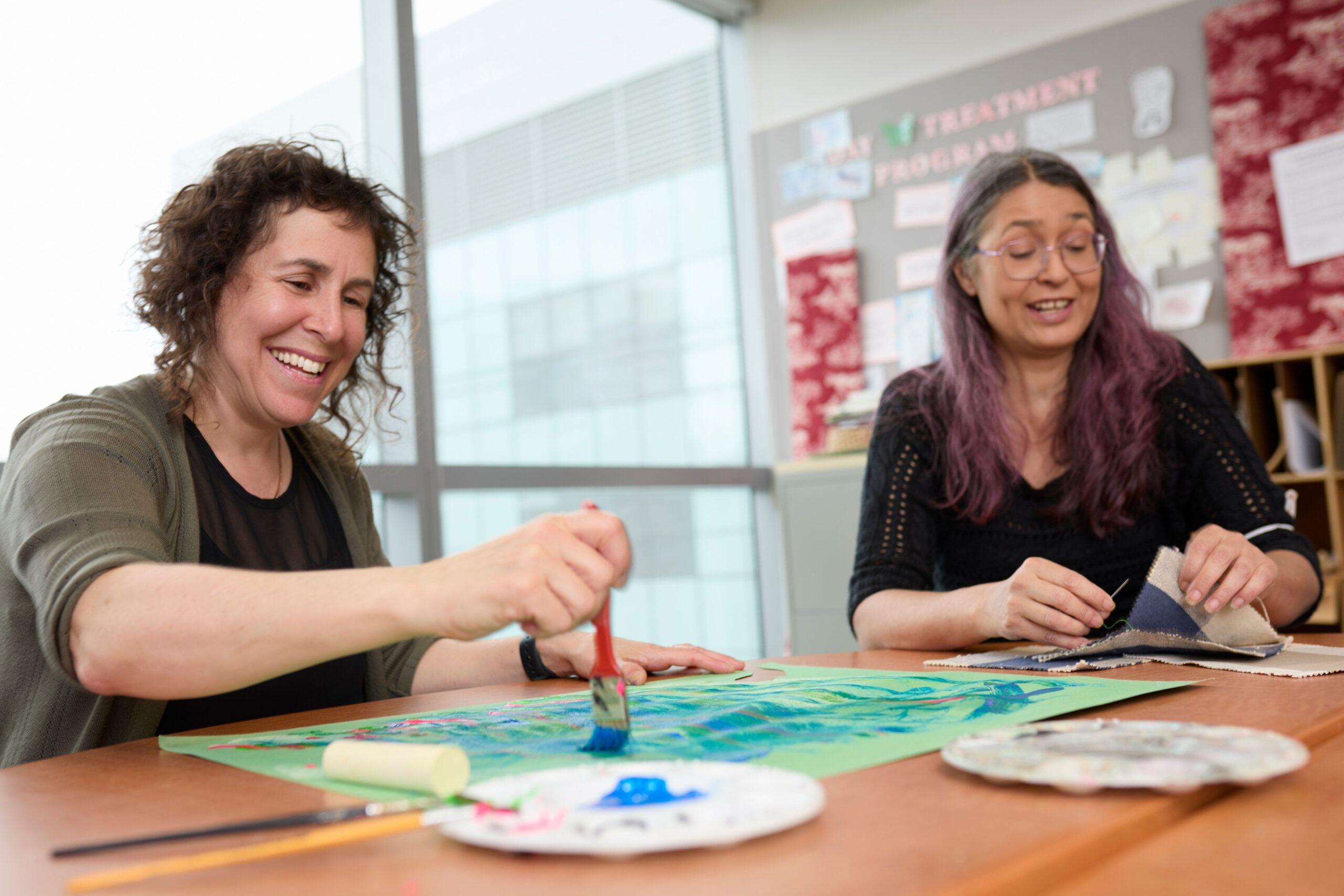Approaching mental health through creative expression

Dr. Nancy McCallum in WCH's art room
Approaching mental health through creative expression

Dr. Nancy McCallum in WCH's art room
When you walk into the art room at Women’s College Hospital (WCH), you’ll see the prompt of the day written across the whiteboard. Today’s prompt is ‘Light in Darkness.’ It’s not uncommon to have preconceived notions about what therapy is and what it looks like in practice. But many may not imagine an art room with paints, fabrics and clay.
Art therapy is an effective technique for approaching complex feelings or trauma because it provides a nonverbal method of exploring experiences, thoughts, and feelings that patients may struggle to put into words. Whether it’s visual arts like painting and sculptures or written art like songs, narrative stories or poetry, patients are encouraged to connect with their emotions using creative mediums.
Through the mental health department and the sexual assault/domestic violence care centre (SA/DVCC) at WCH, art therapy is built into their approach to facilitating recovery.
“In the Trauma Therapy program, training for our learners in psychiatry, psychotherapy and social work includes exposure to the modality of art therapy,” says Dr. Nancy McCallum, a psychiatrist at WCH. “It’s another way to get to know their patients.”
The Women Recovering from Abuse Program (WRAP) is designed to support women and gender-diverse people who are looking to heal and recover from the impact of childhood interpersonal trauma. As the longest-standing trauma therapy program at WCH, this multimodal intensive day program revolves around group therapy, with art being one of its core pillars.
Approaching therapy from an artistic lens can be the gateway many patients need to overcome barriers and inhibitions in their healing process. Cultural or personal beliefs and language barriers are common deterrents from traditional talk therapy, but using art as a tool for self-expression can allow patients to overcome these deterrents.
“Not every patient comes in ready to talk about their feelings or the trauma they’ve experienced,” shares Dr. McCallum. “But art can provide them a safe space to help them do that.”
Art therapists' primary intervention is to inspire curiosity. They encourage patients to reflect on the experience of creating their artwork, interpret its meaning, and consider their emotional responses. In art therapy, it’s not about the end product—it’s about embracing the journey and the feelings it brings forth.

Left to right: Abby Hershler, psychiatrist, and Julie Blair, social worker and mental health therapist
“Art grants us access to playfulness and reminds us not to take ourselves too seriously,” says Emma Moore, social worker at the SA/DVCC. “There isn’t pressure on getting something perfect or to produce a polished, final product.”
Creating a piece of art that mirrors vulnerable emotions and sharing it with others can be empowering and cathartic. It can even help the creator connect more deeply with the art and the emotions.
There is an affirmation that comes with sharing art, creating a sense of being seen and understanding that your feelings haven’t been made up or imagined. As damaging as it can be for someone not to feel believed in their struggles with mental health, it can be just as healing to know you are seen and heard.
“There is value in keeping artwork as a way to reflect on therapy. It’s a visual record of healing – something tangible that captures the learning or changes they’ve made in therapy,” says Emma.
Providing women with a stage to connect and heal from trauma and oppression while also giving them the opportunity to explore the parts of themselves that experience joy, celebration, growth and hope underscores the fundamental role of art therapy in the mental health services delivered at WCH.
Programs like WRAP and SA/DVCC are foundational in upholding WCH as a welcoming, safe space and a champion for women within the ever-evolving healthcare and mental health landscape.
The YWCA Elm Centre is a not-for-profit housing complex with 300 mixed housing units for women and gender-diverse people and their children. In partnership with Women’s College Hospital (WCH) and Jean Tweed Centre, a community-based substance use and mental health agency, they added collaborative psychiatric care to the existing WCH-YWCA primary care collaboration to address mental healthcare needs within the supportive housing setting.